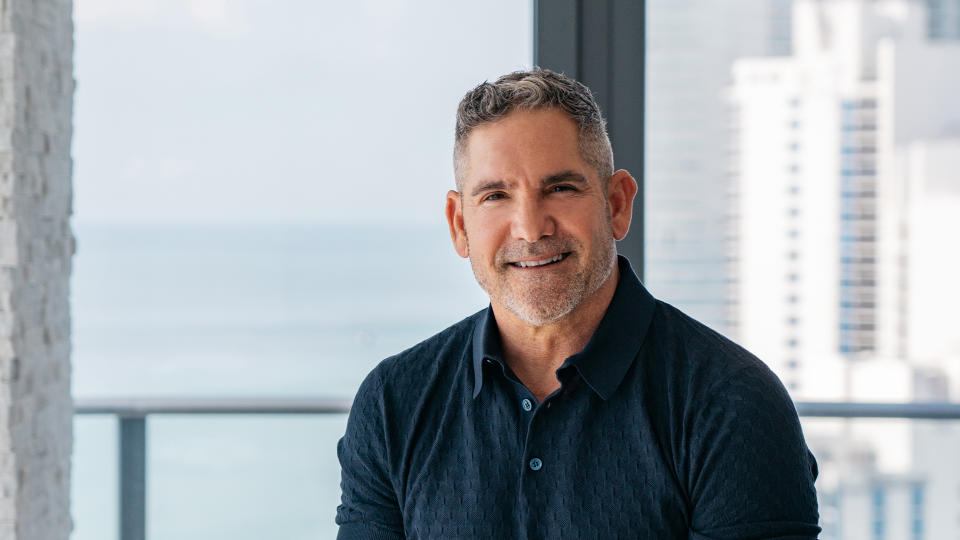Grant Cardone: These Are the 3 Money Lessons You Need To Build Wealth

Grant Cardone, a well-known financial influencer, was asked what he would tell his children if he could share only three financial lessons with them.
Read More: I’m a Self-Made Millionaire — I Followed These 7 Grant Cardone Tips To Get Rich
Learn More: 5 Subtly Genius Things All Wealthy People Do With Their Money
Here’s what he believes to be the three most important bits of financial advice.
Wealthy people know the best money secrets. Learn how to copy them.
People and Relationships Are an Investment
Cardone believes that relationships are investments that can greatly impact your financial success. Building and maintaining strong relationships can lead to new opportunities, provide helpful advice and offer support during tough times.
Check Out: Dave Ramsey’s Best Passive Income Ideas for 2024 — 15 ‘Steady, Profitable’ Ways To Build Wealth Fast
Networking Opportunities
Networking shows how relationships can be investments. For example, Howard Schultz, the former CEO of Starbucks, formed a crucial connection with Jerry Baldwin, one of the company’s three founders.
When deciding whether to hire Shultz, the two other founders, Gordon Bowker and Zev Siegl, were unconvinced, but Baldwin campaigned for him until they all agreed. This relationship helped Schultz eventually lead Starbucks to great success, proving that networking can open doors to opportunities that you might not have had otherwise.
Guidance and Support
Mentorship is another way relationships can be investments. For example, Steve Jobs, co-founder of Apple, mentored Mark Zuckerberg, the founder of Facebook. Jobs’ advice on product focus and company culture played a key role in Facebook’s growth.
Having your own mentor can provide valuable insights and advice, speeding up your path to success.
Building and Maintaining Relationships
To build and maintain relationships, be genuine and show interest in others. Attend industry events, join community activities and offer help without expecting immediate returns. Relationships can be considered investments, but don’t be transactional in how you deal with others. Being genuine and sincere is one of the most important parts of interacting with other people.
As Cardone said, “Money is a people game.”
Focus on Steady Returns Over Time
Cardone recommends focusing on steady annual returns of around 7% to 8% and investing your money every year to increase your wealth over time instead of seeking quick, high-risk gains. This approach aligns with the principle of using compound growth in long-term investing, which is often considered to be the key to building sustainable wealth.
Compound Interest
Compound interest is the interest earned on both the initial balance of an investment and the accumulated interest from previous periods. Albert Einstein reportedly called it the “eighth wonder of the world.”
To illustrate, consider two individuals, Allie and Trevor. Allie invested $10,000 with an annual return of 6% at age 25. Trevor invested the same amount at the same rate, but he started at age 35. By age 65, Allie’s investment will have grown significantly more than Trevor’s, purely due to the extra decade of compounding. While Trevor will have $57,435, Allie will have $102,857, almost twice as much.
This is why it’s important to start early and let your investments grow over time.
Real Estate
Real estate is another example of an investment that can provide steady returns over time. Cardone has generated significant wealth through real estate investments. Properties can generate rental income and have historically appreciated in value over time.
Index Funds and ETFs
Investing in index funds and exchange-traded funds is another way to achieve steady returns. These funds offer exposure to a broad market index, like the S&P 500, and are less volatile than individual stocks.
Vanguard founder Jack Bogle championed low-cost index fund investing, showing that consistent investments in such funds can outperform actively managed funds over the long term. This strategy is ideal for those seeking stable, long-term growth with lower management fees and reduced risk.
Don’t Lose Your Money on Risky Investments
Cardone’s third lesson is to avoid losing money on risky investments. While taking calculated risks can be part of a balanced investment strategy, it’s important to distinguish between calculated risks and reckless gambles.
Risk Tolerance
Defining your risk tolerance is a key part of investing. Risk tolerance is your ability to endure market volatility and potential losses — how much of your money you’re willing to risk for potential gains.
Younger investors may have a higher risk tolerance due to their longer time horizons, giving them more time to recover from potential losses. Older investors nearing retirement typically have a lower risk tolerance, since they’re mostly focusing on preserving the money they already have.
Avoiding High-Risk Investments
High-risk investments, such as speculative stocks, options and certain cryptocurrencies, can lead to significant losses. Consider the story of Theranos, a biotechnology company that was meant to revolutionize blood testing for diseases and other conditions. Investors poured millions of dollars into the company based on unverified claims, only to lose all of their money when Theranos collapsed.
Emergency Fund and Risk Management
An emergency fund provides a financial cushion during unexpected events, such as a job loss or medical emergency, helping you avoid the need to liquidate your investments at a bad time. Financial advisors often recommend having three to six months’ worth of living expenses saved.
Due Diligence and Research
Due diligence is necessary before you make any investment decision. Warren Buffett, one of the most successful investors of all time, is known for his meticulous research and value-based investing approach. He focuses on companies with strong fundamentals, competitive advantages and long-term growth potential.
By analyzing financial statements, industry trends and management teams, Buffett minimizes his risk and invests in companies with solid prospects.
More From GOBankingRates
This article originally appeared on GOBankingRates.com: Grant Cardone: These Are the 3 Money Lessons You Need To Build Wealth